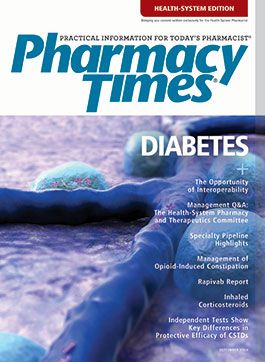Publication
Article
Pharmacy Practice in Focus: Health Systems
The Opportunity of Interoperability
Technology is not going away, as we continue to automate manual systems and push data and information to the point of decision making. We need to utilize this information to provide optimal services and ensure that our patients are getting access to the highest-quality care.
If you have ever attended a sales presentation by a software or technology vendor, you have probably heard the term “plug and play” or “a simple interface.” Either term usually refers to the standalone program the vendor is promoting for easily connecting to the information technology (IT) system of an organization. Unfortunately, connecting to the IT system never seems to be easy when the technology is installed. History shows that implementation takes more time and resources than originally planned, pharmacy’s specific needs might not be everyone else’s priority in an organization, and the vendor may say something like “We have never seen this before” when installation of the program doesn’t go as planned.
The pendulum has definitely shifted from a focus on “best-of-breed” IT systems to enterprisewide IT systems. However, we should not be dismayed by our past experiences or current perspectives in trying to garner support for standalone technologies. Although the benefits of having one system are noted, it’s hard for large technology companies and systems to create at the pace of innovation in health care and to have knowledge and expertise in all the various niches of pharmacy. Therefore, we cannot avoid selecting, installing, and building interfaces with standalone products.
It is important that we stress our need for integration of all systems, with free flow of data through robust interfaces (interoperability). Although it is sometimes easier to avoid working to generate support and resources for a technology, or not to interface it at all, this is a bad decision in the long term. Interoperability is the future of health care technology and the activities of pharmacy departments, and is essential for optimal patient care.
For pharmacy to take full advantage of the future interoperability of IT systems, the following needs to be considered:
- We need to use real-time data for making patient care decisions. Health care has been slow to fully utilize data in robust decision making for managing patients and the efficiency of operations. Much of the reason for this is a lack of access to data or not having individuals who can present it for optimal utilization. If we are not intentional in demonstrating the need, or the opportunity, for how data can be used for decision making, we cannot obtain positions for individuals who have data analytic skills.
- We need to have technology work for us, instead of us having to work for technology. I hear of many scenarios in which departmental operations have to work around limitations and capabilities of a technology. This is concerning because we are the customer and the technology should be customized to our needs. Although there might be times when a workaround is a safety issue and, therefore, should not be allowed, in many other situations, pharmacy is held back by the limitations of a technology and an organization’s lack of interest in being flexible. This is a travesty we should not tolerate.
- We should not fear standalone technologies. I believe an enterprisewide system cannot meet all our professional needs. Therefore, we need to be willing to strategize and push for boutique systems that can make our operations more efficient. This requires boutique system providers to integrate into our operations and fit into legacy systems. Failure to do this will limit overall adoption success and create opportunities for technologies that can work.
Technology is not going away, as we continue to automate manual systems and push data and information to the point of decision making. We need to utilize this information to provide optimal services and ensure that our patients are getting access to the highest-quality care.
I would appreciate your insights and experiences regarding this topic. Let me know what you think by e-mail at [email protected] or follow me on Twitter at @stepheneckel.
Stephen F. Eckel, PharmD, MHA, BCPS, is associate director of pharmacy at the University of North Carolina (UNC) Medical Center and clinical associate professor at the UNC Eshelman School of Pharmacy.

Newsletter
Stay informed on drug updates, treatment guidelines, and pharmacy practice trends—subscribe to Pharmacy Times for weekly clinical insights.






